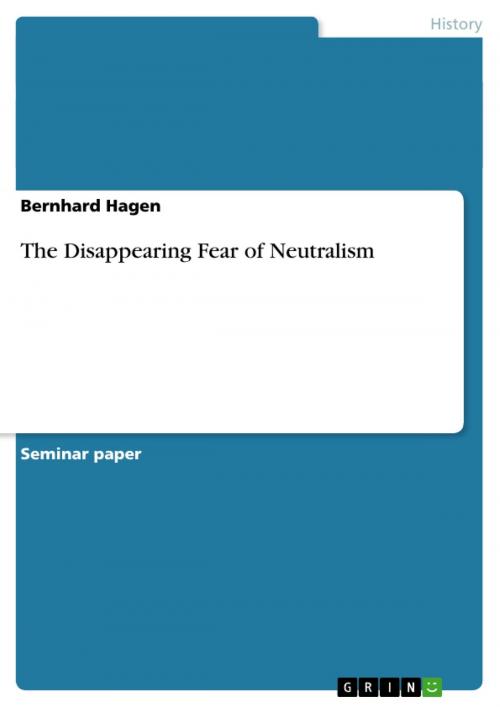| Author: | Bernhard Hagen | ISBN: | 9783638308090 |
| Publisher: | GRIN Publishing | Publication: | September 21, 2004 |
| Imprint: | GRIN Publishing | Language: | English |
| Author: | Bernhard Hagen |
| ISBN: | 9783638308090 |
| Publisher: | GRIN Publishing |
| Publication: | September 21, 2004 |
| Imprint: | GRIN Publishing |
| Language: | English |
Seminar paper from the year 2003 in the subject History Europe - Germany - Postwar Period, Cold War, grade: very good, University of New Orleans (History Department), course: SE American History, language: English, abstract: Various studies discuss the American view of the Austrian State Treaty and Austrian neutrality, both concluded in 1955. There are a number of studies concerning the Eisenhower- and Kennedy Administrations regarding Austrian neutrality. In all of them, the American fear of neutralism plays a key role. Securing Austria's close connection with 'western ideology' and therefore minimizing Soviet influence were main goals of U.S. policy towards Austria. The neutral state should at least show ideological support of the West in the East-West conflict. In the first part of this paper, I will try to describe the difference between the terms 'neutrality' and 'neutralism'. Afterwards, it is necessary to discuss the Eisenhower and Kennedy Administrations policies towards Austria and give a brief overview of this time. The main goal is to examine the Johnson Administration's view of Austrian neutrality. The records in the Lyndon Baines Johnson Library in Austin, Texas, indicate that there was no more fear of Austrian neutralism by the mid-1960s. This paper analyses this development and discusses the status of Austrian neutrality in the sixties. Did the Eisenhower Administration succeed in pulling Austria to the 'western side' in the Cold War? Was neutrality simply unimportant in the sixties? What consequences does neutrality have for the process of European integration? Other important aspects touched on in this essay are Austrian relations with Eastern Europe, relations with the European Economic Community and U.S. financial support for the Austrian Armed Forces, the 'Bundesheer'.
Seminar paper from the year 2003 in the subject History Europe - Germany - Postwar Period, Cold War, grade: very good, University of New Orleans (History Department), course: SE American History, language: English, abstract: Various studies discuss the American view of the Austrian State Treaty and Austrian neutrality, both concluded in 1955. There are a number of studies concerning the Eisenhower- and Kennedy Administrations regarding Austrian neutrality. In all of them, the American fear of neutralism plays a key role. Securing Austria's close connection with 'western ideology' and therefore minimizing Soviet influence were main goals of U.S. policy towards Austria. The neutral state should at least show ideological support of the West in the East-West conflict. In the first part of this paper, I will try to describe the difference between the terms 'neutrality' and 'neutralism'. Afterwards, it is necessary to discuss the Eisenhower and Kennedy Administrations policies towards Austria and give a brief overview of this time. The main goal is to examine the Johnson Administration's view of Austrian neutrality. The records in the Lyndon Baines Johnson Library in Austin, Texas, indicate that there was no more fear of Austrian neutralism by the mid-1960s. This paper analyses this development and discusses the status of Austrian neutrality in the sixties. Did the Eisenhower Administration succeed in pulling Austria to the 'western side' in the Cold War? Was neutrality simply unimportant in the sixties? What consequences does neutrality have for the process of European integration? Other important aspects touched on in this essay are Austrian relations with Eastern Europe, relations with the European Economic Community and U.S. financial support for the Austrian Armed Forces, the 'Bundesheer'.















